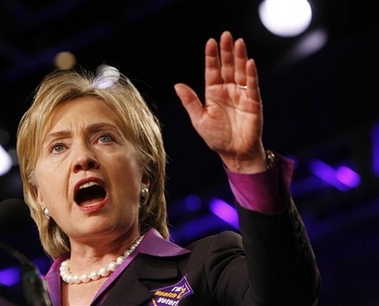 CAIRO: The US State Department’s 2010 report on International Religious Freedom labeled the Muslim Brotherhood as a religious group that is oppressed by the Egyptian government, sparking criticism from experts and human rights groups.
CAIRO: The US State Department’s 2010 report on International Religious Freedom labeled the Muslim Brotherhood as a religious group that is oppressed by the Egyptian government, sparking criticism from experts and human rights groups.
US report says MB oppressed, Egypt's Copts face discrimination
By-Heba Fahmy /Daily News Egypt
Top Stories
00:11
Sunday ,21 November 2010

“In 1954 the government outlawed the Muslim Brotherhood, an Islamist party that operates missionary, charitable, and political activities, regarding it as a threat to National Democratic Party (NDP) rule,” the report said.
“Muslim Brothers speak openly and publicly about their views and identify themselves as members of the organization, although they remain subject to arbitrary detention and pressure from the government,” the report added.
Hossam Tammam, a researcher of Islamist movements, told Daily News Egypt, “Mentioning the Brotherhood in this report is a methodical mistake.”
“The Brotherhood’s problem with the regime is a political problem not a religious problem, as they represent the mainstream faith in Egypt and are not considered a minority like Bahai’s,” Tammam said.
Tammam compared the Brotherhood’s relationship with the government to that of Al Karama Party and others parties that have not been authorized by the government.
“This puts the Brotherhood in jeopardy of being a religious group that has special demands (not a political contestant to the current regime),” he said.
Gamal Eid, executive director of the Arab Network for Human Rights Information, said, “The Brotherhood is not a religious group, it’s a political group and it represents the strongest opposition group in Egypt.”
MB-affiliated independent candidate and current MP Mohamed El-Beltagi told Daily News Egypt, “This is a fact, the Brotherhood are discriminated against by the government and are always subjected to crackdowns and detentions.”
Since the MB announced on Oct. 9 that they will participate in the parliamentary elections set for Nov. 28, Egypt’s security forces have launched a crackdown on the group detaining nearly 600 members most of whom had been released, according to the group’s website.
Tammam said that the report will not benefit the Brotherhood in the upcoming elections. “Egypt announced that it will not allow any foreign interference in the upcoming elections, not even international observers,” he said.
“Also, the United States will not change its perception (against) the Brotherhood based on a report, as this perception is based on the country’s interests in the region including Egypt’s stance towards the Israeli-Palestinian conflict and allowing religious freedoms and diversity in the country,” he added.
El-Beltagi said, “We [the Brotherhood] are not complaining to America about our situation in Egypt, we are also not against America’s documentation of the facts and the government’s violation of the Brotherhood’s human rights.”
Candidates of the MB, which is officially banned from politics, typically run in parliamentary elections as independent candidates. In 2005, the MB won 88 seats — almost 20 percent of the 445 seats, which established it as the largest opposition group in the PA at the time.
The State Department’s report also accused the Egyptian government of discrimination against the participation of Copts in the political arena.
“As of June 30, 2010, there were six Christians (five appointed, one elected) in the 454-seat People's Assembly; six Christians (all appointed) in the 264-seat Shoura Council; two in the 32-member cabinet; and one governor of the country's 28 was Christian,” the report said.
“The government rarely nominates Copts to run in elections as NDP candidates. Out of 92 candidates put forward by the NDP to run in the June 1 Shoura Council election, three were Copts,” the report added.
“Discrimination against Copts is partly because of the government, but also because of the culture of the Egyptian society,” Eid said.
Tammam cited culture as well as the lack of decent education and poverty as the main reasons behind sectarian tension and discrimination against Copts.
“What the NDP and any political party cares about is gaining a voice among the people and winning the majority of seats in parliamentary elections, it’s doesn’t matter whether the candidate is Copt or Muslim as long as [they] get the vote,” he said.
“The dominance of the Salafi beliefs and conservative views in the Egyptian community has made it unacceptable for a large number of Copts to be in control of political decisions,” he added.
According to the report, Egypt has an area of 370,308 square miles and a population of 86 million, almost 90 percent of whom are Sunni Muslims. Shia Muslims constitute significantly less than 1 percent of the population.
While the percentage of Christians range from 8 to 12 percent (6 to 10 million), the majority belonging to the Coptic Orthodox Church. The country's Jewish community numbers approximately 125 persons, mostly senior citizens.


